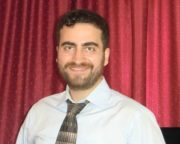Detecting dementia earlier — and at much lower cost — is the goal of a San Antonio Medical Foundation grant awarded to The University of Texas Health Science Center at San Antonio (UT Health San Antonio), The University of Texas at San Antonio (UTSA) and the South Texas Veterans Health Care System.
The project’s impetus is clear. Hispanics, who represent more than 60% of San Antonio’s population, develop dementia earlier and live with it longer on average than other population groups in the U.S.
“Understanding dementia is important for all, but it might be even more beneficial for Hispanics in particular,” said Mohamad Habes, PhD, of the Glenn Biggs Institute for Alzheimer’s and Neurodegenerative Diseases at UT Health San Antonio. Dr. Habes is co-principal investigator of the grant.

The team will collect magnetic resonance imaging (MRI) and electroencephalography (EEG) data from 100 patients. “We are focusing 100% on Hispanics,” Dr. Habes said.
The researchers will apply artificial intelligence (AI) principles to mine the data and paint a picture of how three common dementia subtypes affect individuals. The dementias under study are the most common form, Alzheimer’s disease; the second-most common form, vascular dementia; and frontotemporal dementia.
“Our work will develop a new AI algorithm to understand differences between dementia subtypes in terms of patterns of injury,” Dr. Habes said.
Molecular imaging technologies such as positron emission tomography (PET) remain very expensive. MRI and EEG are non-invasive, relatively cheaper technologies.
The San Antonio Medical Foundation is providing $200,000 for this initiative. The UTSA lead on the project is Dhireesha Kudithipudi, PhD, in the College of Electrical and Computer Engineering, Department of Computer Science. The South Texas Veterans Health Care System lead on the project is Adetoun A. Abisogun Musa, MD, Department of Neurology.
The study is seeking Hispanic individuals ages 55-89 who suffer from dementia, as well as others in that age range who have no diagnosis of dementia and would be enrolled as healthy controls. Participants will undergo a brief MRI scan as well as an electroencephalogram to measure brain-wave activity. The results of these tests will be used toward testing and refining the algorithm.
Anyone interested in more information may contact Valentia Garbarino at 512-766-4723.
The Long School of Medicine at The University of Texas Health Science Center at San Antonio is named for Texas philanthropists Joe R. and Teresa Lozano Long. The school is the largest educator of physicians in South Texas, many of whom remain in San Antonio and the region to practice medicine. The school teaches more than 900 students and trains 800 residents each year. As a beacon of multicultural sensitivity, the school annually exceeds the national medical school average of Hispanic students enrolled. The school’s clinical practice is the largest multidisciplinary medical group in South Texas with 850 physicians in more than 100 specialties. The school has a highly productive research enterprise where world leaders in Alzheimer’s disease, diabetes, cancer, aging, heart disease, kidney disease and many other fields are translating molecular discoveries into new therapies. The Long School of Medicine is home to a National Cancer Institute-designated cancer center known for prolific clinical trials and drug development programs, as well as a world-renowned center for aging and related diseases.
The University of Texas Health Science Center at San Antonio, also referred to as UT Health San Antonio, is one of the country’s leading health sciences universities and is designated as a Hispanic-Serving Institution by the U.S. Department of Education. With missions of teaching, research, patient care and community engagement, its schools of medicine, nursing, dentistry, health professions and graduate biomedical sciences have graduated more than 37,000 alumni who are leading change, advancing their fields, and renewing hope for patients and their families throughout South Texas and the world. To learn about the many ways “We make lives better®,” visit www.uthscsa.edu.
Stay connected with The University of Texas Health Science Center at San Antonio on Facebook, Twitter, LinkedIn, Instagram and YouTube.
To see how we are battling COVID-19, read inspiring stories on Impact.


